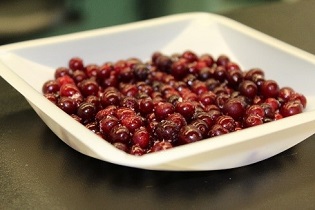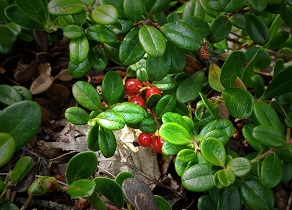Set up an interview
Media Relations
Agriculture and Agri-Food Canada
1-866-345-7972
aafc.mediarelations-relationsmedias.aac@agr.gc.ca
Researchers with Agriculture and Agri-Food Canada (AAFC) are setting the stage for a Canadian-grown superfood: lingonberries.
Lingonberries are already popular in Scandinavian cuisine where they are used in sauces and baked goods. Small, tart and slightly sweet, they are native to British Columbia, Manitoba, Saskatchewan and Atlantic Canada, and have the potential to become a valuable crop for Canadian growers.
The lingonberry is closely related to the blueberry and cranberry, and like them, they are high in antioxidants. Research is showing that these antioxidants are showing promising health benefits, especially for their role in preventing inflammation.
"This berry from the north has untapped potential as a versatile, flavourful and nutritious approach to maintaining kidney health, as shown by our research. This lingonberry research highlights the kind of work we do at Canadian Centre for Agri-Food Research in Health and Medicine. A centre dedicated to bridging the gap between agriculture, food and medicine."
Dr. Chris Siow, Research Scientist, Canadian Centre for Agri-Food Research in Health and Medicine
Since 2009, Dr. Chris Siow, Research Scientist with AAFC and principal investigator with the Canadian Centre for Agri-Food Research in Health and Medicine (CCARM), located at St. Boniface Hospital in Manitoba, has been working with other researchers across the country on a variety of lingonberry research projects. They have found several beneficial health properties.
Lingonberries are especially high in the antioxidant "anthocyanins," which is known to prevent oxidation of blood cholesterol and aid in keeping blood vessels healthy. Researchers believe these potent antioxidants may be able help reduce the risk of heart disease and even some cancers.
Lingonberries also contain health-promoting dietary fibre, vitamin C, polyphenols and omega-3 fatty acids.
Lingonberry consumption can also improve kidney function.
The team studied rats who were going to undergo kidney operations and found that those who had consumed lingonberry juice for three weeks beforehand had improved kidney function, reduced kidney stress and reduced inflammation following the operation in comparison to those that had had no lingonberry juice.
Most recently, the team has also shown lingonberries as a possible alternative approach to the management of chronic kidney disease and non-alcoholic fatty liver disease. Researchers looked at mice fed a high fat diet. These mice became obese and had abnormal levels of fat and glucose in their blood. In addition, they had high levels of kidney and liver disease indicators and inflammation-promoting molecules, which damaged the function of their kidneys and liver. Another group of mice were fed the same diet but had lingonberry added - their test results and kidney and liver functions were substantially improved.
Interestingly, lingonberries' remarkable disease-fighting properties are enhanced the farther north they are grown. This is why AAFC researchers in Manitoba and in Newfoundland are looking into the agricultural potential of the crop.
Also good news for Canadian producers: the demand for lingonberries currently outstrips the supply from wild harvest, so there is an opportunity for producers to increase production. Dr. Samir Debnath of AAFC's St. John's Research and Development Centre in Newfoundland has been developing a number of promising cultivated European varieties and wild Canadian lingonberry hybrids.
The future looks bright for this superfood!
Key discoveries/benefits
- Lingonberries contain more anthocyanins, the pigments that give them their red colour, per gram than most commonly consumed berries (that is, blueberries, cranberries). It is these compounds that may provide health benefits.
- Research looked at three particular areas of health that lingonberries might help: heart, kidney and liver function.
- AAFC scientists found that lingonberries growing in Canada's northern regions have higher antioxidant content and offer the greatest health benefits. There is an opportunity for northern agriculture not only to expand but also to produce healthful foods for consumers across Canada and abroad.
Photo gallery


